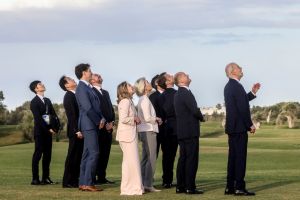Javier Milei pledged to “make Argentina great again” when he took to the CPAC stage in February. The Argentine president is a self-proclaimed anarcho-capitalist who, like Donald Trump, rose to prominence promising to deliver shockwaves to his country. The first six months of Milei’s presidential term have been notable for the sudden domestic reforms he has enacted — cutting government ministries, devaluing the peso and slashing subsidies — but he has also found himself at the heart of tensions between the world’s two great powers, America and China. On this, he is acting uncharacteristically carefully.
Ending economic cooperation with China is simply not an option
Milei has already met twice with General Laura Richardson, one of the most senior military figures for the US in the region, and announced the purchase of twenty-four American-made F-16s from Denmark, a move seen as deepening the growing ties between the US and South America’s second-largest economy. He has also, in the short six months since the election, taken several trips to the US, meeting Donald Trump and Elon Musk. Given Milei’s pro-capitalist views, it is perhaps no surprise that he should naturally pursue a closer relationship with the US.
Milei, however, is not just backing the US, but quietly testing how successfully Latin American governments can push back against growing Chinese influence in the region. Last year, Milei announced that Argentina would be abandoning its application to join the BRICS group of countries, of which China is a founding member. In a letter to the bloc, he said the announcement by his predecessor of a desire to join was no longer “considered appropriate.” Last month, Milei also announced the government would inspect a Chinese military-run space facility in Patagonia, days after the US ambassador appeared to criticize the Argentine government for allowing the station to be built.
Xi’s government has been spreading its soft power across South America, as it has across the world. Argentina itself joined the Belt and Road infrastructure initiative in 2022, and Chinese companies have snaffled up contracts to exploit Argentina’s vast lithium fields in the north and its shale gas reserves in the south. Argentina is home to around a fifth of the world’s lithium, a vital component for the manufacturing of electric vehicles, but its reserves remain underexploited. Chinese companies have so far paid hundreds of millions of dollars to get a piece of the pie. China is also one of the largest buyers of Argentine exports, most notably soybeans, which make up a significant portion of Argentina’s income.
Before Milei, the most recent Perónist government — which was routed last November — instituted largely left-wing policies and deepened ties with China. (Argentina’s politics have for most of its modern history been dominated by the Perónists, a politically schizophrenic movement that defies western categorizations of left or right.) In the last administration’s final days, it authorized a gargantuan currency swap in a desperate attempt to shore up the economy.
Such ties cannot be easily walked away from, with several analysts predicting dire consequences for Argentina’s economy if it loses access to Chinese money. This places Milei in a difficult position — keen to court the US and its western allies, but reliant on Chinese money to stave off even higher inflation and poverty. “The country desperately needs income of US dollars in order to pay its external debt and stabilize the economy,” says Julio Montero, an associate professor at San Andrés University. “The relationship with China is of critical importance.”
Despite moves away from BRICS, two of its most important members — Brazil and China — are Argentina’s two biggest trading partners. Ending economic cooperation is simply not an option. Similarly, Milei’s libertarian politics — which prioritize free markets — collide with the idea of blocking off trade with an entire country. Despite describing Xi’s government as “assassins” during his campaign trail, Milei’s rhetoric has been decidedly more diplomatic line in the months since. In an interview with Bloomberg last month, Milei said: “We have always said that we are libertarians. If people want to do business with China, they can.” In a BBC interview last week he refused to repeat his previous criticisms.
Diplomatic saber-rattling aside, most ordinary Argentines will be forgiven for not giving too much thought to whether their country aligns with China or the US. Annual inflation has hit nearly 300 percent, with the cost of everyday goods now proving burdensome for even some of those in the middle-classes. The most recent poverty statistics have more than half of the population struggling to make ends meet. Milei faced another general strike this week, while a new 10,000 peso note (worth slightly over ten dollars) has recently been launched as a response to rampantly rising prices.
Milei has rightly made reducing inflation the priority of his government. While he has had some success in cooling price rises and reigning in the runaway economy, there is still a long way to go. Waving goodbye to China, at this point, would be disastrous to this project. Minor posturing is one thing — a major change in relationship, would be quite another.
This article was originally published on The Spectator’s UK website.


















